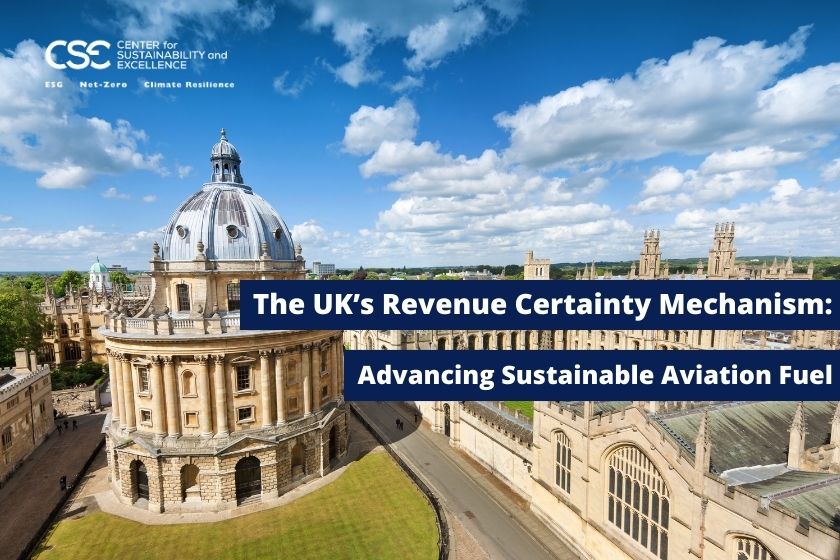Revenue Certainty Mechanism (RCM) in the UK
The Revenue Certainty Mechanism (RCM) is a new UK government policy. It aims to speed up the development of Sustainable Aviation Fuel (SAF). The RCM guarantees stable returns for producers. This reduces investment risk and encourages a shift away from fossil fuels. As aviation faces growing pressure to decarbonize, the RCM becomes a key part of the UK’s plan to reach net-zero flight emissions by 2050.
To support this vision, the UK government is rolling out the RCM as part of its broader SAF policy framework. By offering long-term market stability, the mechanism encourages private investment and enables clean fuel developers to scale more confidently. In this article, we’ll explore what has been decided, who the mechanism affects, how and when it will be implemented, and how it aligns with the UK’s broader decarbonization efforts.
What Has Been Decided About the RCM?
In January 2025, the UK government announced its decision to implement a Guaranteed Strike Price model for the RCM. Much like the Contracts for Difference (CfD) model used in renewable electricity markets, this approach ensures that SAF producers receive a guaranteed price for their fuel.
-
If market prices fall below the strike price, the RCM will cover the difference.
-
If prices exceed the strike price, producers will return the surplus.
To keep the mechanism financially sustainable, the Department for Transport (DfT) proposed a variable levy in March 2025. Aviation fuel suppliers would pay into the fund. This fund would protect SAF developers from market swings and show the government’s long-term support for clean fuels.
Who Will Be Affected by the Revenue Certainty Mechanism?
The RCM is primarily designed to benefit SAF producers, particularly those facing steep upfront costs and uncertain returns. However, its impact extends across the broader aviation ecosystem:
-
Aviation fuel suppliers will contribute to the fund through the proposed levy.
-
Airlines may need to adapt their fuel procurement strategies as costs and availability shift.
-
Investors and project developers will gain greater revenue visibility, making SAF projects more attractive and bankable.
By reducing financial risk and ensuring predictable returns, the RCM is expected to unlock significant private investment and drive infrastructure growth in the SAF sector.
When Will the RCM Be Introduced?
The UK government plans to launch the RCM in 2026, in line with its goal of having at least five commercial SAF plants under construction by 2025—a key milestone in the SAF mandate.
Here’s a high-level timeline:
-
Mid-2025: The government will continue stakeholder consultations and gather industry feedback.
-
Late 2025: Officials will finalize policy design and introduce the necessary legislation.
-
2026: The Revenue Certainty Mechanism will go live, providing revenue stability to SAF producers.
This phased approach allows time for project planning, regulatory alignment, and effective industry participation.
UK Government’s Position on the RCM
The Department for Transport has emphasized that the RCM is crucial for accelerating investment in SAF. According to its official January 2025 response:
“A revenue certainty mechanism is essential to support the commercial deployment of SAF production facilities, which often face higher capital and operational costs compared to fossil fuels.”
This statement makes the government’s position clear. SAF is vital for achieving the UK’s Jet Zero Strategy, and the RCM is a smart, market-driven way to scale production. Rather than functioning as a subsidy, the mechanism corrects market imbalances and helps clean fuels compete with cheaper fossil-based alternatives.
£63 Million Boost Through the Advanced Fuels Fund (AFF)
To further support the SAF industry, the UK government also committed £63 million in funding for 2025/26 through the Advanced Fuels Fund (AFF). This initiative aims to accelerate project development by:
-
Financing commercial-scale SAF facilities
-
Supporting innovative production technologies
-
Enabling regional projects in key areas like Teesside and Humberside
The AFF helps bring early-stage projects to an investment-ready state, closing the gap between innovation and commercialization. In doing so, it not only builds a stronger SAF supply chain but also promotes regional economic development and industrial decarbonization.
WHy the RCM and AFF Matter for Sustainable Aviation in the UK
Together, the Revenue Certainty Mechanism and the Advanced Fuels Fund form a comprehensive strategy to position the UK as a global leader in clean aviation:
-
The RCM offers long-term price stability and encourages private investment in SAF.
-
The AFF unlocks early-stage innovation and strengthens the UK’s project pipeline.
Rather than responding reactively to climate targets, the UK is proactively building a competitive, future-ready aviation industry rooted in sustainability and innovation.
Upskilling for the Green Transition
Professionals aiming to stay ahead in ESG can join the Certified Sustainability (ESG) Practitioner Program by the Center for Sustainability and Excellence (CSE), available in Europe and the UK. The hands-on course teaches practical skills to build and apply ESG strategies aligned with global standards.
Book your spot for the upcoming cohort and join a growing network of certified ESG leaders.







